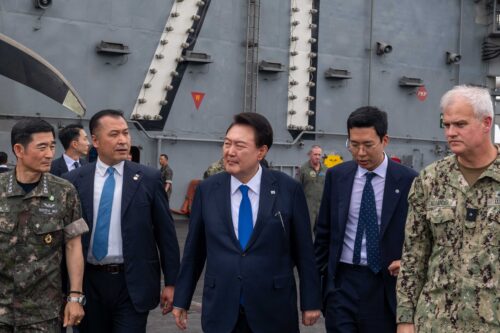South Korean authorities investigating three Chinese students accused of illegally filming the American nuclear-powered aircraft carrier, the USS Theodore Roosevelt, while it was docked in Busan on Jun. 25 have found out that one of the accused have previously been recognised as a model member of the Chinese Communist Party. The incident has raised serious concerns as investigators believe the students may have been acting under the direction of Chinese intelligence.

This incident unfolded as President Yoon Suk Yeol was preparing to board the USS Theodore Roosevelt. Thankfully, vigilant soldiers carrying out security operations spotted a drone in the vicinity and apprehended the three Chinese students. The subsequent investigation revealed hundreds of photographs of South Korean and American military installations on their mobile phones.
Adding to the intrigue, investigators discovered that one of the students had been awarded the distinction of “excellent Communist Party member” at a Chinese university in 2021. Further examination of their phones uncovered contact details for Chinese public security officials and newsletters from the Communist Party. This, coupled with the fact that the students had previously surveyed the Busan Korea Fleet Command in 2022 and filmed other U.S. Navy vessels like the USS Springfield and USS Nimitz, has led South Korean intelligence to believe that these students may have been gathering information on South Korean and U.S. military assets for an extended period.
The potential consequences for the students are severe. In addition to charges of violating the Military Base and Facility Protection Act, they could face treason charges. This case has also ignited calls for South Korea to bolster its legal framework to combat espionage by foreigners. Currently, espionage laws primarily target North Korea, classified as an “enemy country,” leaving a gap in addressing espionage from other nations. A step toward rectifying this was taken on Oct. 13th when the National Assembly Legislation and Judiciary Committee Bill Review Subcommittee approved an amendment to the Criminal Act. This amendment broadens the definition of espionage to encompass “foreign countries or organizations similar thereto,” thus enabling the application of these laws to individuals from nations beyond North Korea.
For more information, hit the Source below